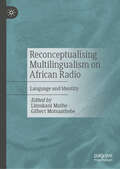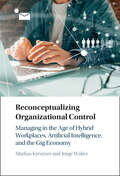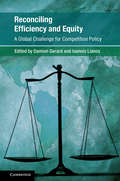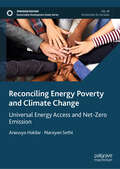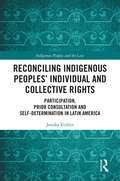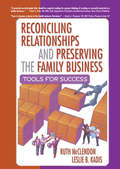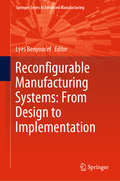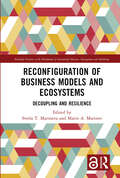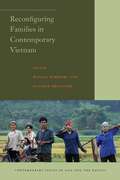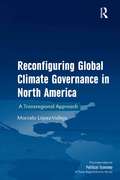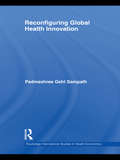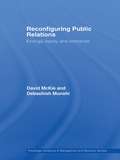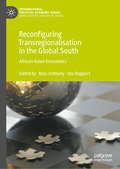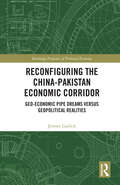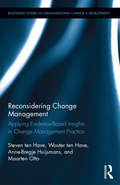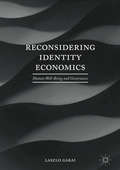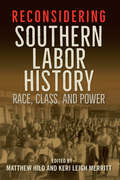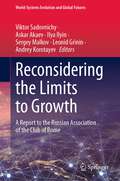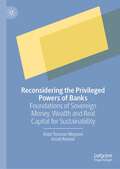- Table View
- List View
Reconceiving the Challenge of Change--The Importance of Individual Development
by Lisa Laskow Lahey Robert KeganIn the complex and ever-changing world we live in, human capability will be the critical variable in the new century. But leaders who seek to win a war for talent by conceiving of capability as a fixed resource to be found "out there" put themselves and their organizations at a serious disadvantage. Your ability to develop yourself, your people, and your teams, on the other hand, will distinguish your leadership ability. This chapter introduces a body of research on the development of mental complexity in adulthood, which has major implications for increasing personal as well as organizational adaptability. This chapter is excerpted from "Immunity to Change: How to Overcome It and Unlock the Potential In Yourself and Your Organization."
Reconceptualising Global Finance and Its Regulation
by Ross P. Buckley Emilios Avgouleas Buckley, Ross P. and Avgouleas, Emilios and Arner, Douglas W. Douglas W. ArnerThe current global financial system may not withstand the next global financial crisis. In order to promote the resilience and stability of our global financial system against future shocks and crises, a fundamental reconceptualisation of financial regulation is necessary. This reconceptualisation must begin with a deep understanding of how today's financial markets, regulatory initiatives and laws operate and interact at the global level. This book undertakes a comprehensive analysis of such diverse areas as regulation of financial stability, modes of supply of financial services, market infrastructure, fractional reserve banking, modes of production of global regulatory standards and of the pressing need to reform financial sector ethics and culture. Based on this analysis, Reconceptualising Global Finance and its Regulation proposes realistic reform initiatives, which will be of primary interest to regulatory and banking legal practitioners, policy makers, scholars, research students and think tanks.
Reconceptualising Multilingualism on African Radio: Language and Identity
by Gilbert Motsaathebe Limukani MatheThis book redefines multilingualism via the concept of radio in Africa. Africa presents unique challenges of lingual diversity which the media still struggles to accommodate, particularly when it comes to indigenous languages. Contributors argue that the linguistic realities of African radio reflect ethnic co-existence and fluidity of identity in pre-colonial, colonial and post-colonial contexts. They argue that communities consist of several “majorized” and “minoritized” indigenous languages which, if closely analysed, reflect a commonality of multilingualism. The book also suggests practical measures through which linguistic co-existence could be achieved and explores cases that redefine, reconceptualize and reframe multilingualism on African radio.
Reconceptualizing Organizational Control: Managing in the Age of Hybrid Workplaces, Artificial Intelligence, and the Gig Economy
by Markus Kreutzer Jorge WalterOrganizational control addresses the fundamental yet vexing managerial problem of aligning workers' capabilities, activities, and performance with organizational goals and aspirations. In recent years, the onset of COVID-19, combined with new developments in information and communication technologies, has brought about profound changes in organizations, and even in the nature of work itself. We have seen surges in virtual and remote work; progression of alternative work arrangements (especially in the gig economy); and an increasingly wide-spread reliance on algorithmic monitoring and control. These changes have exacerbated the tension between the pursuit of individual and organizational interests, exposing the limits of traditional approaches to organizational control, and questioning whether they still reflect contemporary organizational realities. Providing a comprehensive discussion of the multi-disciplinary approaches to organizational control, this book integrates the new and evolving trends in technology, organizations, and society into a reconceptualization of organizational control for twenty-first-century organizations.
Reconciling Efficiency and Equity: A Global Challenge for Competition Policy (Global Competition Law and Economics Policy)
by Ioannis Lianos Damien GerardDue to the growing influence of economics and economists in competition law and policy discourse and the internationalization of antitrust, the equity versus efficiency trade-off debate has played a defining role in the transformation of the dominant paradigm governing competition law enforcement since at least the 1970s. The debate remains crucial today as issues of economic inequality and its interaction with efficiency become of central concern to policy and decision-makers in competition law, as well as in other spheres of public policy. Despite their central role in the grammar of competition law on the global plane, the intellectual underpinnings of the interactions between 'equity' and 'efficiency' in the context of competition law have never been examined in-depth. This book aims precisely to fill this gap by discussing new approaches in understanding the role of efficiency and equity concerns in competition law.
Reconciling Energy Poverty and Climate Change: Universal Energy Access and Net-Zero Emission (Sustainable Development Goals Series)
by Anasuya Haldar Narayan SethiThis book highlights innovative solutions that not only combat climate change but also address energy poverty, ensuring a more sustainable and equitable future. It explores common roots, synergies, and trade-offs between energy poverty and climate change. It argues that policies to combat climate change like decarbonization, can negatively impact energy poverty alleviation, whereas policies to reduce energy poverty like increasing energy access, reduction in energy prices, or rise in energy demand, may increase energy-related carbon emission that contributes to climate change.This book meticulously delves into the challenges of providing clean, reliable, and modern energy access to millions of energy-poor people, without creating any negative impact on the environment. It not only provides a comprehensive review of the intricacies of energy poverty and climate change mitigation but also gives a clear understanding of the policy challenges encountered to address the dual problem. Moreover, given the sustainable development goals of attaining SDG7 by 2030 and SDG13 by 2050, the content is timely and significant. Apart from students, this book will be beneficial to academics, working as development economists or energy economists, government policymakers, media personnel covering the climate crisis, and social activists.
Reconciling Expectations: The Unexpected Challenges of Transitioning from Individual Contributor to Manager
by Linda A. HillWhen a new manager steps into their role, initial expectations about the job and the tasks associated with managing fall quickly by the wayside. Most new managers must go through a period of unlearning what it means to be an individual contributor before they can fully step into the role of manager. Author Linda A. Hill followed nineteen new managers through their first year, gathering data about the managerial transition. In this chapter, she focuses on their experiences in the first six months, reconciling their expectations of power and control with the realities of day-to-day managerial work and the expectations of their subordinates. This chapter was originally published as Chapter 2 of "Becoming a Manager: How New Managers Master the Challenges of Leadership."
Reconciling Indigenous Peoples’ Individual and Collective Rights: Participation, Prior Consultation and Self-Determination in Latin America (Indigenous Peoples and the Law)
by Jessika EichlerThis book critically assesses categorical divisions between indigenous individual and collective rights regimes embedded in the foundations of international human rights law. Both conceptual ambiguities and practice-related difficulties arising in vernacularisation processes point to the need of deeper reflection. Internal power struggles, vulnerabilities and intra-group inequalities go unnoticed in that context, leaving persisting forms of neo-colonialism, neo-liberalism and patriarchalism largely untouched. This is to the detriment of groups within indigenous communities such as women, the elderly or young people, alongside intergenerational rights representing considerable intersectional claims and agendas. Integrating legal theoretical, political, socio-legal and anthropological perspectives, this book disentangles indigenous rights frameworks in the particular case of peremptory norms whenever these reflect both individual and collective rights dimensions. Further-reaching conclusions are drawn for groups ‘in between’, different formations of minority groups demanding rights on their own terms. Particular absolute norms provide insights into such interplay transcending individual and collective frameworks. As one of the founding constitutive elements of indigenous collective frameworks, indigenous peoples’ right to prior consultation exemplifies what we could describe as exerting a cumulative, spill-over and transcending effect. Related debates concerning participation and self-determination thereby gain salience in a complex web of players and interests at stake. Self-determination thereby assumes yet another dimension, namely as an umbrella tool of resistance enabling indigenous cosmovisions to materialise in the light of persisting patterns of epistemological oppression. Using a theoretical approach to close the supposed gap between indigenous rights frameworks informed by empirical insights from Bolivia, the Andes and Latin America, the book sheds light on developments in the African and European human rights systems.
Reconciling Relationships and Preserving the Family Business: Tools for Success
by Ruth Mcclendon Leslie B KadisLearn how to keep family problems from affecting the family business! Reconciling Relationships and Preserving the Family Business: Tools for Success presents a comprehensive model for reconciling fractured relationships within the business-owning family. Studies show that more than two-thirds of family-owned businesses don't survive past the first generation-and more than 90 percent of all business enterprises in the United States are owned by families. Written by the founders of the Carmel Institute for Family Business, this unique book is an essential tool for people involved in family businesses, where personal issues can mix with financial interdependencies and work grievances to cause professional failures independent of bad management, market conditions, or financial constraints. Reconciling Relationships and Preserving the Family Business is a practical and concise guide to building healthy families and collaborative family business teams that last for generations. The book introduces the ideology that frames the Reconciliation Model for relationship repair, and defines two main systemic problems facing business-owning families: oppression and disengagement. It also presents an in-depth study of a business-owning family, demonstrating how the Reconciliation Model works-step-by-step. Reconciling Relationships and Preserving the Family Business addresses, including: basic principles of relationships in business-owning families individual dynamics that account for human dilemmas power issues effective intervention in troubled relationships assessing relationship patterns family structure and process roles, responsibilities, and ethics of advisors working with family-owned businesses and much more! Reconciling Relationships and Preserving the Family Business is a vital resource for members of business-owning families and for the professional people who advise them: lawyers, therapists, bankers, clinical social workers, accountants, consultants, and therapists. The book is invaluable for teaching you to recognize real or potential relational problems that can have an adverse effect on the family business.
Reconfigurable Manufacturing Systems: From Design to Implementation (Springer Series in Advanced Manufacturing)
by Lyes BenyoucefThis book develops innovative techniques from operational research and management science for the design and implementation of a reconfigurable manufacturing system (RMS), and subsequently analyzes and assesses their performance. A reconfigurable manufacturing system (RMS) is a paradigm that can address many of the challenges posed by the modern market. Accordingly, substantial research is now being conducted on RMS, focusing on various levels of decision-making (strategic, tactical and operational). However, as a relatively new research area, there are still only very few books and articles available on reconfigurable manufacturing system design and management. In addition to filling that gap, this book provides a forum for investigating, exchanging ideas on, and disseminating the latest advances in the broad area of RMS applications in today’s industry. Gathering contributions by experts from academia, industry and policy-making, it represents an essential contribution to the existing literature on manufacturing and logistics in general and industry 4.0 in particular.
Reconfiguration of Business Models and Ecosystems: Decoupling and Resilience (Routledge Frontiers in the Development of International Business, Management and Marketing)
by Marin A. Marinov Svetla T. MarinovaDecoupling of business models and ecosystems is the disconnection of certain characteristic activities originally planned and completed in coincidence. It could bring in an immense adverse shock in the functioning of established business models and ecosystems possibly bringing them to resilience. Core causes for decoupling and resilience of business models and ecosystems are jolts, known as global crisis, universal pandemics, etc. The undesirable outcomes of critical events can reveal unique circumstances for business model and ecosystem resilience. Business model and ecosystem resilience represents a mandatory prerequisite for firms challenging their functioning and even very existence. Research has been conducted thus far, nevertheless this theme requires significantly more consideration. The key objective of this book is to bring further insights in the field delivering a thorough examination of the ways in which business models and ecosystems can develop resilience under extraordinary conditions. In the book, the resilience of business models and ecosystems is analysed aiming to investigate further the specifics of the relevant processes securing resilience and its outcomes. The resilience of business models and ecosystems is scrutinised as a credible way for enhancing the predispositions of firm’s survivability.
Reconfiguring Families in Contemporary Vietnam
by Danièle Bélanger Magali BarbieriReconfiguring Families in Contemporary Vietnamchronicles and analyzes the most significant change for families in Vietnam's recent past - the transition to a market economy, referred to asDoi Moiin Vietnamese and generally translated as the "renovation". Two decades have passed since the wide-ranging institutional transformations that took place reconfigured the ways families produce and reproduce. The downsizing of the socialist welfare system and the return of the household as the unit of production and consumption redefined the boundaries between the public and private. This volume is the first to offer a multidisciplinary perspective that sets its gaze exclusively on processes at work in the everyday lives of families, and on the implications for gender and intergenerational relations. By focusing on families, this book shifts the spotlight from macro transformations of the renovation era, orchestrated by those in power, to micro-level transformations, experienced daily in households between husbands and wives, parents and children, grandparents and other family members.
Reconfiguring Global Climate Governance in North America: A Transregional Approach (The International Political Economy of New Regionalisms Series)
by Marcela Lopez-VallejoGlobal climate governance has presented problems that have led to failures, yet it has also opened the door to new transregional governance schemes, especially in North America. This book introduces an environmental dimension into the concept of governance. Almost fifteen years after the climate global governance concept emerged, results worldwide have not been as favorable as expected. This book details previous discussions about the concept of global climate governance and its limits. It highlights how the Kyoto Protocol has a limited design taking into account a national approach to global, regional, and transnational problems, had no obligatory mechanisms for implementation and explains the emergence of new polluters not committed under it such as China and India. Furthermore this book explores other levels of authority such as regional institutions - the North American agreement on trade (NAFTA) and on environment (NAAEC), as well as the regional energy working group (NAEWG). The author puts forward a theoretical proposal for re-territorialization and coordination of policies for climate change into new forms of articulating interests in what she terms transnational green economic regions (TGERs) and tests this on two case studies - the Regional Greenhouse Gas Initiative (RGGI) and the Western Climate Initiative (WCI). This study presents the challenges and opportunities of a transregional approach in North America.
Reconfiguring Global Health Innovation (Routledge International Studies In Health Economics Ser. #7)
by Padmashree Gehl SampathReconfiguring Global Health Innovation presents the findings of multi-year research, contrasting experiences of different latecomer countries in building health innovation systems to cater to local needs. It analyses the emerging industrial structures in health innovation as more and more latecomer countries are foraying into what is a highly difficult and technologically intensive sector, with the aim of finding ways and means to balance these promising developments with public health needs worldwide. The bookpresents empirical findings from six countries across Asia and Africa on health innovation, namely, India, Bangladesh, Vietnam, Kenya, Tanzania and Nigeria. The book concludes that the growth of knowledge and the accumulation of capabilities influence the ability of a country to generate wealth.
Reconfiguring Public Relations: Ecology, Equity and Enterprise (Routledge Advances In Management And Business Studies)
by David McKie Debashish MunshiInnovative and timely, this PR book is the first to address environmental questions within the context of global business. An excellent counterpoint to the existing US-oriented literature on this topic, here the authors set out ways to equip public relations to respond to and re-imagine itself in the light of current major forecasts and trends for
Reconfiguring Transregionalisation in the Global South: African-Asian Encounters (International Political Economy Series)
by Ross Anthony Uta RuppertThis volume examines the Africa-Asia relationship from a transregional perspective, namely as a set of emergent social, political and economic practices spanning a number of analytical and spatial scales. Drawing on a host of countries from both regions, the contributions illustrate how encounters increasingly transcend fixed territorial categories at local, national and regional levels. While large-scale political and economic considerations tend to dominate in Asia-Africa related literature—for instance, in China-Africa, BRICS and South-South discourses—the current volume seeks to foster dialogue between these broader levels of analyses and more localized social practices and experiences, including the role of civil society, cultural production and migration. With an emphasis on the “trans” aspects of inter-regional exchange, the volume contributes to a better understanding of new forms of space-making between these two increasingly important regions.
Reconfiguring the China-Pakistan Economic Corridor: Geo-Economic Pipe Dreams Versus Geopolitical Realities (Routledge Frontiers of Political Economy)
by Jeremy GarlickThere has been a great deal of speculation and prognostication about the China-Pakistan Economic Corridor (CPEC). The project’s name suggests it is intended to be an ‘economic corridor’ connecting Pakistan overland with China’s Xinjiang province. This book examines whether CPEC’s primary purpose is as an overland conduit for trade and economic cooperation between China and Pakistan. The key finding is that aims related to regional geopolitics and internal security have, in reality, a more significant impact. The book demonstrates that China’s goals in Pakistan are primarily geopolitical rather than geo-economic, since the notion of constructing an economic and transportation ‘corridor’ between Pakistan and China is logistically and economically problematic due to a range of foreseeable problems. Most importantly, border disputes with India and the containment of domestic separatism motivate are the driving forces for cooperation between the partners. This book will be of interest to scholars who research on BRI and policy makers.
Reconfiguring the Museum: The Politics of Digital Display
by Ana-Maria HermanDigital media technologies have provided an occasion not only for novel ways to display and exhibit collections, but also for new politics to arise as museums and urban settings change. While some believe these changes are driven by humans, others see digital media technologies at the heart of these changes. Reconfiguring the Museum offers a third explanation that considers both the social and technical together and thereby captures the experimental nature of introducing novel digital media technologies to museums, and the uncertainty, messiness, contingency, and complexity involved. In this sociotechnical case study of a novel augmented reality app – first designed to exhibit collections from the Museum of London across the sprawling capital city, and later remade for the McCord Museum to display collections throughout Montreal – Ana-Maria Herman reveals how the app introduced unexpected new relations between the museums, their collections, advertising agencies, sponsors, technology companies, corporations, urban spaces, and end users. She shows how museum practices related to curating, designing, building, visiting, and modifying exhibitions were transformed, and how, in such unsettled arrangements, what we think of as old cultural politics can unexpectedly re-emerge, while new digital politics – related to big data, surveillance, and automated processes – may not necessarily materialize.A detailed account of emerging actors and practices involved in making digital exhibitions, Reconfiguring the Museum offers practical considerations for museum, culture, and heritage practitioners charged with creating digital displays and accounting for their success or failure.
Reconsidering Central Bank Independence
by Andreas Freytag Stan Du Plessis Dawie van LillCentral bank independence has become one of the most widely accepted tenets of modern monetary policy. According to this view, the main role of independent central banks is to maintain price stability through the adjustment of short-term interest rates. Reconsidering Central Bank Independence argues that the global financial crisis has undermined confidence in this view as central banks increasingly have to address concerns other than price stability, such as financial stability, the need for output recovery and other broader policy goals. Large balance-sheet expansion by central banks followed the global financial crisis, which overlapped considerably with the financial policy of their respective governments. Exploring the consequences of this shift to a more diverse set of policy challenges, this book calls for a return to the consensus role for central banks and analyses what this might mean for their future independence.
Reconsidering Change Management: Applying Evidence-Based Insights in Change Management Practice (Routledge Studies in Organizational Change & Development #16)
by Steven ten Have Wouter ten Have Anne-Bregje Huijsmans Maarten OttoDespite the popularity of organizational change management, the question arises whether its prescriptions and dominant beliefs and practices are based on solid and convergent evidence. Organizational change management entails interventions intended to influence the task-related behavior and associated results of an individual, team, or entire organization. There is a perception that a lot of change initiatives fail and limited understanding about what works and what does not and why. Drawing on the field of psychology and based on primary research, Reconsidering Change Management identifies 18 popular and relevant commonly held assumptions with regard to change management that are then analyzed and compared to the four specific themes laid out in the book (people, leadership, organization, and change process), resulting in their own set of assumptions. Each assumption will have a brief introduction in which its relevance and popularity is explained. By studying the scientific evidence, in particular meta-analytic evidence, the book provides students and academics in the fields of change management, organizational behavior, and business strategy the best available evidence for the acceptance or dropping of certain (change) management assumptions and their accompanying practices. By exploring the topics people, leadership, organization, and process, and the related assumptions, change management is restructured and reframed in a prudent, positive, and practical way.
Reconsidering Identity Economics
by Laszlo GaraiThis book presents an unorthodox identity economics that approaches social identity through a non-classical psychology. Garai applies the modern physics concept of wave-particle duality to economic psychology, finding a corresponding duality in object-oriented activity and historically generated social identity. These two factors interconnect to create a double-storied structure of social identity and its behavioral manifestations. The book then presents a calculation device for mediating between behavioral and identity economics. Garai then applies all these factors to two socioeconomic systems developed during the second modernization: Bolshevik-type "socialism" and post-Bolshevik "capitalism. " In this context, he examines the Eastern Bloc nomenklatura as a duality of bureaucratic and patron-client organization ("state and party") and the establishment of both today's material capitalism and its other half: human capital economics.
Reconsidering Southern Labor History: Race, Class, and Power
by Matthew Hild and Keri Leigh MerrittUnited Association for Labor Education Best Book Award The American Dream of reaching success through sheer sweat and determination rings false for countless members of the working classes. This volume shows that many of the difficulties facing workers today have deep roots in the history of the exploitation of labor in the South. Contributors make the case that the problems that have long beset southern labor, including the legacy of slavery, low wages, lack of collective bargaining rights, and repression of organized unions, have become the problems of workers across the country. Spanning nearly all of U.S. history, the essays in this collection range from West Virginia to Florida to Texas. They examine vagrancy laws in the early republic, inmate labor at state penitentiaries, mine workers and union membership, and strikes and the often-violent strikebreaking that followed. They also look at pesticide exposure among farmworkers, labor activism during the civil rights movement, and foreign-owned auto factories in the rural South. They distinguish between different struggles experienced by women and men, as well as by African American, Latino, and white workers. The broad chronological sweep and comprehensive nature of Reconsidering Southern Labor History set this volume apart from any other collection on the topic in the past forty years. Presenting the latest trends in the study of the working-class South by a new generation of scholars, this volume is a surprising revelation of the historical forces behind the labor inequalities inherent today. Contributors: David M. Anderson | Deborah Beckel | Thomas Brown | Dana M. Caldemeyer | Adam Carson | Theresa Case | Erin L. Conlin | Brett J. Derbes | Maria Angela Diaz | Alan Draper | Matthew Hild | Joseph E. Hower | T.R.C. Hutton | Stuart MacKay | Andrew C. McKevitt | Keri Leigh Merritt | Bethany Moreton | Kristin O’Brassill-Kulfan | Michael Sistrom | Joseph M. Thompson | Linda Tvrdy
Reconsidering Value and Labour in the Digital Age (Dynamics Of Virtual Work)
by Christian Fuchs Eran FisherThis volume explores current interventions into the digital labour theory of value, proposing theoretical and empirical work that contributes to our understanding of Marx's labour theory of value, proposes how labour and value are transformed under conditions of virtuality, and employ the theory in order to shed light on specific practices.
Reconsidering the Limits to Growth: A Report to the Russian Association of the Club of Rome (World-Systems Evolution and Global Futures)
by Leonid Grinin Andrey Korotayev Ilya Ilyin Askar Akaev Viktor Sadovnichy Sergey MalkovEchoing the famous "The Limits to Growth" report from 1972, this edited volume analyses the changes that the World System has undergone to the present, on the fiftieth anniversary of the original report. During the past fifty years, both the concept and understanding of these limits have significantly changed. This book highlights that the evolution of the World System has approached a new critical milestone, moving into a fundamentally new phase of historical development, when the old economic and social technologies no longer work as efficiently as before or even begin to function counterproductively, which leads the World System into a systemic crisis. The book discusses the transition of human society to a new phase state, the shape of which has not yet been determined. New approaches are needed for both, for the analysis of the global situation, and for forecasts. The book is based on an integrated approach including the world-systems, historical and evolutionary perspectives, as well as a systematic view of society, in which changes in one subsystem cause transformations in others. Through mathematical modeling, it defines the main vectors of transformations of the World System; makes a detailed forecast of the development of all the main subsystems of the society and the World System, while presenting horizons of changes from short-term to ultra-long-term; and presents different development scenarios as well as recommendations on how to achieve a transition to the most favorable scenario. The book will appeal to members and followers of the Club of Rome, policy-makers, as well as to scholars from various disciplines interested in a better understanding of the World System evolution, global futures, development studies, climate change, and future societies.
Reconsidering the Privileged Powers of Banks: Foundations of Sovereign Money, Wealth and Real Capital for Sustainability
by Kozo Torasan Mayumi Ansel RennerThis book explores the privileged powers commercial banks hold, namely, their ability to create money out of nothing and then have that money grow in tune with a positive interest rate. Said powers defy, in an unnatural sense, the first and second laws of thermodynamics. The necessity of understanding the dual natures of money, wealth, and real capital, or, put differently, the reality that these three entities are simultaneously individual affluence and collective biophysical debt, is emphasized. The book culminates by proposing completely new foundations of money, wealth, and real capital for any society on a pathway of responsible development.

